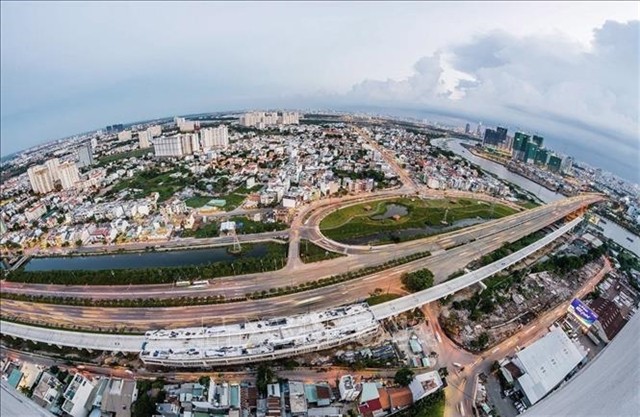 |
| A view of HCM City's District 2 with Hanoi Highway and Metro Line 1 Ben Thanh - Suoi Tien. District 2 is undergoing development to emerge as a financial hub. (Photo: VNA) |
This initiative is particularly focused on the cities of Da Nang and Ho Chi Minh City, which are poised to become key players in the Southeast Asian financial landscape. The collaboration encompasses various sectors, including finance, technology and education, aiming to enhance Vietnam's capabilities in these areas.
The relationship between the UK and Vietnam has evolved dramatically over recent years.
The UK is recognised as the second-largest exporter of financial services globally, with exports reaching 88.7 billion GBP (nearly 114.6 billion USD) in 2022. London serves as a global financial centre, hosting 170 banks and a multitude of fintech companies.
This backdrop provides a solid foundation for collaboration as Vietnam seeks to develop its own financial sector.
In October 2023, the government established a Steering Committee to develop the Regional and International Financial Centre Project, which is led by Prime Minister Pham Minh Chinh. The project aims to position Da Nang as a regional financial centre and HCM City as an international financial hub.
Meanwhile, Da Nang has set ambitious goals to become a leading economic centre in Southeast Asia by 2030. The city aims to focus on two primary sectors: semiconductors and artificial intelligence (AI), alongside developing its international financial hub.
This vision is reinforced by the National Assembly’s Resolution No. 136/2024/QH15, which outlines specific policies to attract strategic investors and enhance financial management practices within the city.
Ho Ky Minh, Vice Chairman of the Da Nang People's Committee, stressed the need for the UK’s support in drafting legal frameworks that would facilitate the establishment of this financial centre.
At a meeting with Alexandra Smith, the newly appointed British Consul General in HCM City, in late October, Minh expressed his hope for collaboration with UK consular representatives to promote Da Nang as an attractive investment destination.
"In the near future, as authorities at all levels come to a consensus on the implementation of international financial centres in HCM City and Da Nang, we eagerly anticipate the support of the British Consulate General in HCM City in formulating the National Assembly's resolution on related legal issues," Minh said.
Meanwhile, Alexandra said that the UK was eager to actively collaborate and assist Da Nang in advancing emerging areas such as AI, digital transformation and establishing an international financial hub.
In September, Michael Mainelli, the Lord Mayor of London, who has a financial background, made a historic visit to Vietnam, the first Lord Mayor of the City of London to visit the country in the past decade, underscoring the UK's commitment to supporting Vietnam’s ambitions in establishing an international financial hub.
During this visit, he engaged with key Vietnamese officials and stakeholders to share insights and strategies for building a robust financial infrastructure.
The Mayor also looked forward to the exciting upcoming collaboration between Vietnam’s new international financial hub and the City of London's Financial District.
The partnership between the UK and Vietnam spans several key areas.
In terms of financial services, the UK's expertise can be invaluable for Vietnam as it seeks to modernise its financial systems.
The UK's experience in regulatory frameworks and market operations can provide crucial guidance for Vietnamese policymakers. Initiatives may include capacity-building training programmes for Vietnamese professionals in finance and investment management, as well as assistance in developing legal structures that support foreign investment and ensure market stability.
Technology integration into finance is vital for creating a competitive international hub. The UK is home to numerous fintech companies that can share their knowledge with Vietnamese counterparts.
Potential collaborations could involve leveraging AI technologies to enhance service delivery in finance and supporting Vietnamese banks and financial institutions in adopting digital solutions to improve efficiency.
Infrastructure development is another critical area where UK assistance can play a significant role. Infrastructure is essential for establishing a successful financial hub, and the UK can aid Vietnam in developing projects such as transportation networks that enhance connectivity through investments in urban rail systems and airports.
Additionally, collaboration on smart city initiatives will promote sustainable urban development aligned with global standards.
As Vietnam aims for net-zero emissions by 2050, green finance will be central to its economic strategy. The UK's commitment to green initiatives can significantly benefit Vietnam’s transition towards sustainable practices.
This includes supporting projects that focus on offshore wind energy and developing green bonds and other financial instruments that promote environmental sustainability.
Opportunities for UK Businesses
UK businesses stand to gain significantly from engaging with Vietnam’s burgeoning economy. As trade relations continue to strengthen, evidenced by bilateral trade doubling from 3 billion GBP to 6 billion GBP over the past decade, opportunities abound across various sectors.
Companies like Standard Chartered have already expressed enthusiasm about contributing to this partnership by facilitating investments and sharing expertise in areas such as green finance and digital innovation.
Furthermore, with the UK's impending accession to the Comprehensive and Progressive Agreement for Trans-Pacific Partnership (CPTPP), there will be enhanced access for UK services in Vietnam, fostering greater collaboration./.


















































